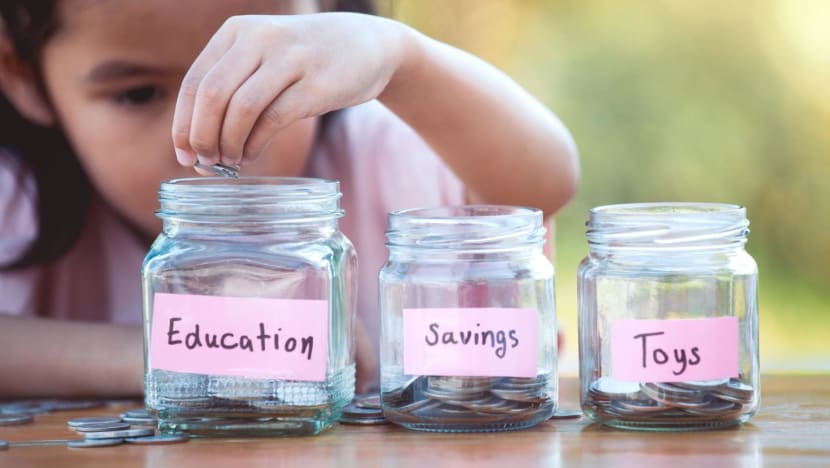Beyond the piggy bank: How parents teach young children about money
Financial literacy is a core life skill – yet it’s not formally taught in schools. Money Mind talks to some millennial and Gen X parents about how they teach their children about money.

SINGAPORE: How early is too early to start teaching your children about money?
For blogger Xie Wanyun, the right time was just before her son Travis began Primary 1.
Ms Xie started those lessons with pretend play. She designed her own grocery cards with items such as onions, strawberries and ice cream with corresponding prices, and asked Travis to calculate the bill for the items.
Now that Travis is settled in school, she’s moved on to other concepts like budgeting.
She gives him S$10 every Sunday night and allows him to decide how he spends - or saves - the money.
“He has to decide how much he wants to bring to school every day. This is to teach him how to ration his money," said Ms Xie, who is also a certified positive parenting coach.
"On certain days he decides to bring only S$1, on other days he wants to bring S$3. And that is up to him.”
Like Travis, Primary 4 student Natalie Ang also manages her own pocket money.
“I started saving money from Primary 1 and my mother taught me how to save money. She said, 'when you buy your food, (take the) balance money, and come home and put it in your piggy bank'," said the nine-year-old.
Natalie and Travis are examples of how Gen X and millennial parents are teaching their kids about money earlier than past generations.
According to financial literacy startup Playmoolah, a key part of starting young is building what it calls financial-emotional resilience.
“What this means is that we grow up with different money narratives. We could say money is a source of conflict, or money is the root of all evil. But we begin to rethink some of these narratives. It could be transformed, for example, to money as a tool for a flourishing life or money can be an enabler for dreams to come true," said Playmoolah co-founder Audrey Tan.
"So you begin to think about how we relate to money and build a relationship with money. We can begin to regulate how we feel and how we think around money,” she added.
While Playmoolah teaches children aged seven and above as well as young adults, at the Institute for Financial Literacy, even expectant parents are coming for courses.
“Perhaps they relate back to their own years of growing up ... when they were a bit fuzzy about how to get a right relationship with money. Perhaps they had some issues with a not-so-healthy relationship from the perspective of how to grow their wealth. So they feel that they want to get some foundations right with the baby coming,” said Mr Lawrence Tan, one of its associate trainers.
While experts say the concept of saving for a rainy day can be taught to children as young as three, by the time they are teenagers, investing concepts can be brought in.
Mr Tan said this is also when young people become more aware of the consumption culture around them.
“When they grow older, they are exposed to more temptation, distractions, fads that they see on social media," said Mr Tan.
"So then you have to sharpen their focus as to the difference between needs and wants. Delayed gratification should be something which is encouraged and rewarded, like putting aside something today or foregoing something today for something more valuable down the road. This then aligns with the concept of investment because you are putting aside something for a yield later down the road.”
Other parents are also laying the foundations for investment portfolios for their children.
Financial blogger Dawn Cher advises other parents on how to start investing. The mother of two also walks the talk, having set up an investment portfolio for both children that consists of stock picks, crypto and robo-investing through index funds.
Her advice is to ensure children’s investments don’t require excess active management.
“If I actively manage theirs, then I’m also teaching them that they need to learn how to actively manage. But that may not be the right method for them depending on what kind of career they want to do in the future. What if they are not like me, someone who actually enjoys investing and the intellectual challenge it provides? What if they just want to invest to beat inflation to make sure their assets don’t deteriorate? So something in the middle is better.”
Regardless of the strategy taken, experts agree that the benefits of exposing children to money from young are not just financial. The biggest payouts may be in other aspects of their lives.
“It also helps with eventually their ability to have a good relationship with their partner ... You can imagine a married couple without a solid relationship with money is kind of rocky. So that’s a fundamental that you can build, that positive relationship with money that’s going to be a lifelong value," said Mr Tan.
Playmoolah’s Ms Tan added that it can also help individuals learn how to emotionally regulate themselves.
“One of the very basic concepts that we impart is the virtue of discernment. Being able to pause at the point of purchase (and decide) is it a need or a want," said Ms Tan.
"So it’s to emotionally regulate ourselves to say, 'let’s pause, we don’t have to rush'. We can just get ourselves calm and really think through this decision. And you realise that this practice can be applied to many different things in our life as well.”


















